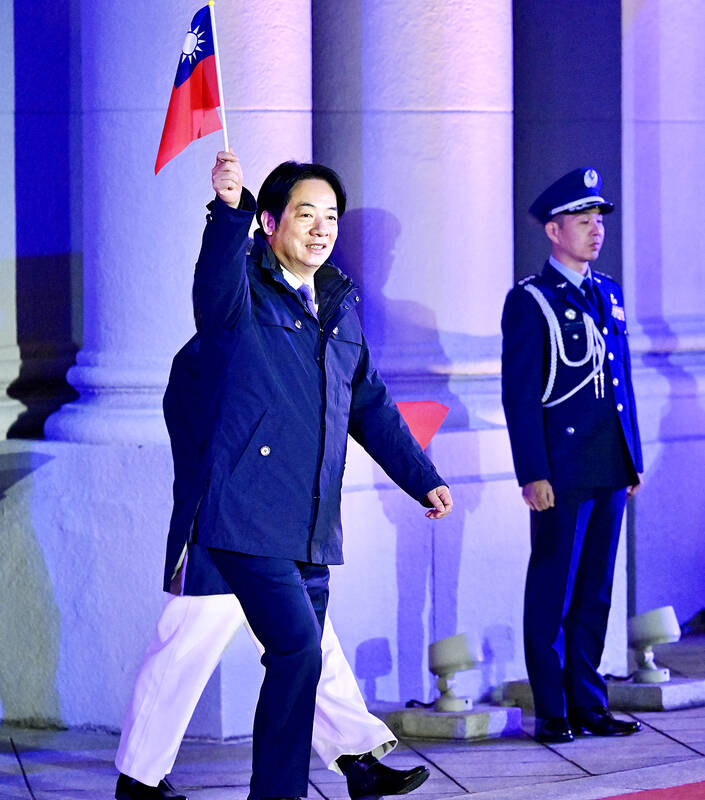President William Lai (賴清德) yesterday called China the “real barrier” to cross-strait exchanges and urged Beijing to hold talks with Taipei to ease tourism restrictions.
“The real barrier to cross-strait exchanges is actually China, not Taiwan,” Lai said, referring to Beijing’s restrictions on Chinese tourists visiting Taiwan, during a question-and-answer session at the Presidential Office in Taipei yesterday following his New Year’s Day address.
“If China is genuinely sincere, I suggest that the Taiwan Strait Tourism Association and the Association for Tourism Exchange across the Taiwan Straits begin negotiations” to ease those restrictions, Lai said.

Photo courtesy of the Taipei City Photojournalists’ Association
The associations were established by Taipei and Beijing respectively to facilitate coordination and negotiations on tourism.
The number of Taiwanese traveling to China for tourism or business was 2.05 million between January and November last year, while only 285,000 Chinese visited Taiwan during the same period, Lai said, citing government data.
The 2.05 million visitors were primarily individual travelers, as Taipei does not allow Taiwanese to travel to China in groups.
Lai criticized Beijing for barring Chinese students from pursuing degrees in Taiwan and for restricting tourism to Taiwan.
He made the comments after being asked about a pledge made by a Shanghai official during the Taipei-Shanghai Twin-City Forum last month that the Chinese city planned to allow its residents to travel to Taiwan.
Only residents from China’s Fujian Province are permitted to travel to Taiwan, but they are limited to Kinmen and Lienchiang counties.
As cross-strait relations remain strained and Beijing continues to refuse to engage in dialogue with the Democratic Progressive Party government, bilateral tourism has taken a hit.
During the news conference, which began with Lai’s New Year’s Day address that barely touched on cross-strait issues, the president also said it was “not worth it” for Taiwanese to apply for a Chinese identification card, which would lead to the revocation of their Taiwanese ID.
He was commenting on a video by a Taiwanese YouTuber who said that many Taiwanese had been encouraged to apply for Chinese ID cards, with about 100,000 having obtained the document.
The government would work to raise awareness of the issue to better prevent Taiwanese from being tempted by “short-term gains” and “going down the wrong path,” Lai said.
The Mainland Affairs Council has said it would look into the matter.
In Beijing, Chinese President Xi Jinping (習近平) in a New Year’s speech said that “no one can stop” unification with Taiwan.
“The people on both sides of the Taiwan Strait are one family. No one can sever our family bonds, and no one can stop the historical trend of national reunification,” Xi said in a speech televised on China Central Television.
Additional reporting by Reuters

REMINDER: Of the 6.78 million doses of flu vaccine Taiwan purchased for this flu season, about 200,000 are still available, an official said, following Big S’ death As news broke of the death of Taiwanese actress and singer Barbie Hsu (徐熙媛), also known as Big S (大S), from severe flu complications, the Centers for Disease Control (CDC) and doctors yesterday urged people at high risk to get vaccinated and be alert to signs of severe illness. Hsu’s family yesterday confirmed that the actress died on a family holiday in Japan due to pneumonia during the Lunar New Year holiday. CDC Deputy Director-General Tseng Shu-hui (曾淑慧) told an impromptu news conference that hospital visits for flu-like illnesses from Jan. 19 to Jan. 25 reached 162,352 — the highest

COMBINING FORCES: The 66th Marine Brigade would support the 202nd Military Police Command in its defense of Taipei against ‘decapitation strikes,’ a source said The Marine Corps has deployed more than 100 soldiers and officers of the 66th Marine Brigade to Taipei International Airport (Songshan airport) as part of an effort to bolster defenses around the capital, a source with knowledge of the matter said yesterday. Two weeks ago, a military source said that the Ministry of National Defense ordered the Marine Corps to increase soldier deployments in the Taipei area. The 66th Marine Brigade has been tasked with protecting key areas in Taipei, with the 202nd Military Police Command also continuing to defend the capital. That came after a 2017 decision by the ministry to station

TRIP TO TAIWAN: The resumption of group tours from China should be discussed between the two agencies tasked with handling cross-strait tourism, the MAC said President William Lai (賴清德) yesterday reassured China-based businesspeople that he would follow former president Tsai Ing-wen’s (蔡英文) cross-strait policy to facilitate healthy and orderly exchanges with Beijing and build a resilient economy. “As president, I have three missions. First, I will follow president Tsai’s ‘four commitments’ to ensure that the country continues to exist and survive,” Lai told participants at a Lunar New Year event in Taipei hosted by the Straits Exchange Foundation (SEF). Lai said his second mission is to uphold the “four pillars of peace” by bolstering national defense, developing a growing and resilient economy, building partnerships with

‘INVESTMENT’: Rubio and Arevalo said they discussed the value of democracy, and Rubio thanked the president for Guatemala’s strong diplomatic relationship with Taiwan Guatemalan President Bernardo Arevalo met with US Secretary of State Marco Rubio in Guatemala City on Wednesday where they signed a deal for Guatemala to accept migrants deported from the US, while Rubio commended Guatemala for its support for Taiwan and said the US would do all it can to facilitate greater Taiwanese investment in Guatemala. Under the migrant agreement announced by Arevalo, the deportees would be returned to their home countries at US expense. It is the second deportation deal that Rubio has reached during a Central America trip that has been focused mainly on immigration. Arevalo said his